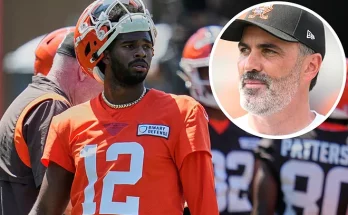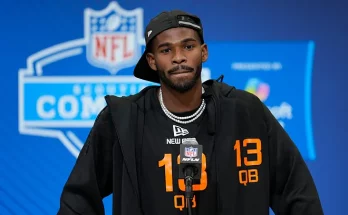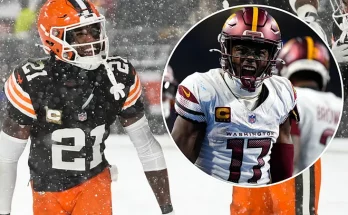The NFL Draft is a time of unrelenting optimism, swirling speculation, and bold projections. Every year, fanbases cling to mock drafts, insiders dish out scoops, and front offices quietly strategize behind closed doors. But in the midst of the excitement surrounding the 2025 NFL Draft, one storyline involving the Tennessee Titans has sparked passionate debate across the league: whether or not the team should select the reigning Heisman Trophy winner.
Despite his electric college career and undeniable talent, a growing number of analysts, former players, and fans alike are urging the Titans to proceed with caution—and, in fact, to look elsewhere. For a team in the middle of a rebuild, selecting a flashy name could sell jerseys and make headlines, but it might not solve the deeper, more systemic issues plaguing the roster.
The Heisman Trophy winner in question has captivated the college football world. His highlight-reel plays, dual-threat capabilities, and leadership have made him a household name. He’s been projected by many as a top-five pick and, in some cases, even the top overall talent in this class. Yet, for all the accolades and hype, critics point to reasons why the Titans—a franchise still trying to find its post-Tannehill identity—might not be the best fit for this generational talent.
For starters, Tennessee’s issues begin in the trenches. The offensive line struggled mightily last season, ranking among the league’s worst in both pass protection and run blocking. Drafting a high-profile skill position player—especially a quarterback or running back—without first addressing the front line is seen by many as putting the cart before the horse. As one AFC executive bluntly put it, “You don’t park a Ferrari in a garage full of potholes.”
The Heisman winner thrived in college behind a top-tier offensive line, with a playbook tailored to his strengths and a coaching staff that maximized every inch of his potential. Transitioning to the NFL—where defenses are faster, schemes are more complex, and windows close in milliseconds—will be an entirely different beast. In a situation like Tennessee’s, where protection is spotty and skill position depth is average at best, there are legitimate concerns that the player could be set up to fail early in his career.
There’s also the question of fit. While the Titans have embraced a more modern, pass-friendly identity under their current leadership, the offensive system remains in flux. The franchise has invested heavily in young quarterback Will Levis, who showed flashes of potential down the stretch last season. Bringing in another high-profile quarterback could not only create a logjam at the position but potentially derail Levis’ development and divide the locker room. Internal stability at quarterback is hard to come by in today’s NFL, and the Titans may not want to risk more turbulence by forcing a controversial pick.
And then there’s the issue of need. The Titans have pressing gaps across multiple units—offensive tackle, edge rusher, wide receiver, and cornerback among them. With a draft class that is widely considered deep and versatile, many believe the Titans would be better served building their foundation before swinging for the fences. A Heisman winner may bring instant star power, but he doesn’t necessarily address the areas where Tennessee is most vulnerable.
Still, not everyone agrees with the cautionary voices. Supporters of the potential pick argue that true talent is rare, and when a player of this caliber is available, you don’t pass him up. “This is a franchise-changer,” one scout told local media. “If the Titans want to compete with the Jaguars and Texans in the AFC South, they’re going to need a superstar—and this kid is just that.”
Those pushing for the Titans to take the Heisman winner point to his ability to extend plays, make something out of nothing, and lift an entire team with his presence. They see a player in the mold of Lamar Jackson or Kyler Murray—players who may not have fit the traditional quarterback mold but reshaped offenses with their explosiveness. In the right system and with the right development, he could become the face of the franchise for the next decade.
But the counterargument is not about talent. It’s about timing. The Titans are not one piece away from contending. Their roster remains a work in progress, and burning a top pick on a luxury when basic structural issues haven’t been addressed feels premature. With new head coach Brian Callahan entering his first full season, many believe he deserves a clean slate—a chance to implement his system with players who fit it, rather than being handed a quarterback whose style may require scheme adjustments from day one.
There’s also the potential media circus. The Heisman winner is a national celebrity, having spent the last year on every highlight show and magazine cover. The moment he steps into Nashville, the spotlight will be blinding. While that may excite some fans, others worry that it could create undue pressure on the coaching staff and disrupt the locker room. The Titans, for all their tradition and grit, have typically shied away from larger-than-life personalities in favor of blue-collar workhorses. This pick would represent a stark departure from that philosophy.
Financially, using a top pick on a quarterback means committing significant resources in guaranteed money and team planning. If the pick doesn’t pan out—or even if it creates competition that stifles Levis’ growth—the ripple effects could be felt for years. It’s a decision that could define Callahan’s tenure before it truly begins.
In a league where drafting is often about best player available versus best fit, the Titans are standing at a crossroads. Do they take the swing at superstardom, knowing full well the risk it entails? Or do they make the more conservative—some might say wise—choice and build out the team piece by piece, avoiding the temptation of the spotlight?
For now, the organization is keeping its cards close to the vest. Front office executives have spoken highly of multiple prospects at multiple positions, and smokescreens are part of the game this time of year. But the chatter around the Heisman winner has grown too loud to ignore. Whether it’s a ploy to drum up trade value or a genuine consideration remains to be seen.
At the end of the day, the Titans must decide what kind of team they want to be—not just in 2025, but five years from now. Do they want to be the team that took the bold swing and landed a star? Or the team that showed patience, discipline, and foresight in building a long-term contender?
Drafting the Heisman Trophy winner would undoubtedly make headlines. It would sell jerseys, energize fans, and give the Titans an instant identity. But as voices around the league continue to warn, it could also come at the cost of growth, cohesion, and hard-earned stability.
The clock is ticking. The spotlight is glaring. The Titans are on the clock—and the whole football world is watching.



